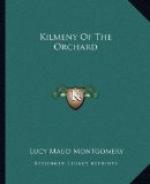“Why are you looking so sober?”
Kilmeny did not have her slate with her and could not answer; but Eric guessed from something in her eyes that she was bitterly contrasting the beauty of the ballad’s heroine with her own supposed ugliness.
“Come down to the house, Kilmeny. I have something there to show you—something lovelier than you have ever seen before,” he said, with boyish pleasure shining in his eyes. “I want you to go and put on that muslin dress you wore last Sunday evening, and pin up your hair the same way you did then. Run along—don’t wait for me. But you are not to go into the parlour until I come. I want to pick some of those Mary-lilies up in the orchard.”
When Eric returned to the house with an armful of the long stemmed, white Madonna lilies that bloomed in the orchard Kilmeny was just coming down the steep, narrow staircase with its striped carpeting of homespun drugget. Her marvelous loveliness was brought out into brilliant relief by the dark wood work and shadows of the dim old hall.
She wore a trailing, clinging dress of some creamy tinted fabric that had been her mother’s. It had not been altered in any respect, for fashion held no sway at the Gordon homestead, and Kilmeny thought that the dress left nothing to be desired. Its quaint style suited her admirably; the neck was slightly cut away to show the round white throat, and the sleeves were long, full “bishops,” out of which her beautiful, slender hands slipped like flowers from their sheaths. She had crossed her long braids at the back and pinned them about her head like a coronet; a late white rose was fastened low down on the left side.
“’A man had given
all other bliss
And all his worldly wealth
for this—
To waste his whole heart in
one kiss
Upon her perfect lips,’”
quoted Eric in a whisper as he watched her descend. Aloud he said,
“Take these lilies on your arm, letting their bloom fall against your shoulder—so. Now, give me your hand and shut your eyes. Don’t open them until I say you may.”
He led her into the parlour and up to the mirror.
“Look,” he cried, gaily.
Kilmeny opened her eyes and looked straight into the mirror where, like a lovely picture in a golden frame, she saw herself reflected. For a moment she was bewildered. Then she realized what it meant. The lilies fell from her arm to the floor and she turned pale. With a little low, involuntary cry she put her hands over her face.
Eric pulled them boyishly away.
“Kilmeny, do you think you are ugly now? This is a truer mirror than Aunt Janet’s silver sugar bowl! Look—look—look! Did you ever imagine anything fairer than yourself, dainty Kilmeny?”
She was blushing now, and stealing shy radiant glances at the mirror. With a smile she took her slate and wrote naively,
“I think I am pleasant to look upon. I cannot tell you how glad I am. It is so dreadful to believe one is ugly. You can get used to everything else, but you never get used to that. It hurts just the same every time you remember it. But why did mother tell me I was ugly? Could she really have thought so? Perhaps I have become better looking since I grew up.”




